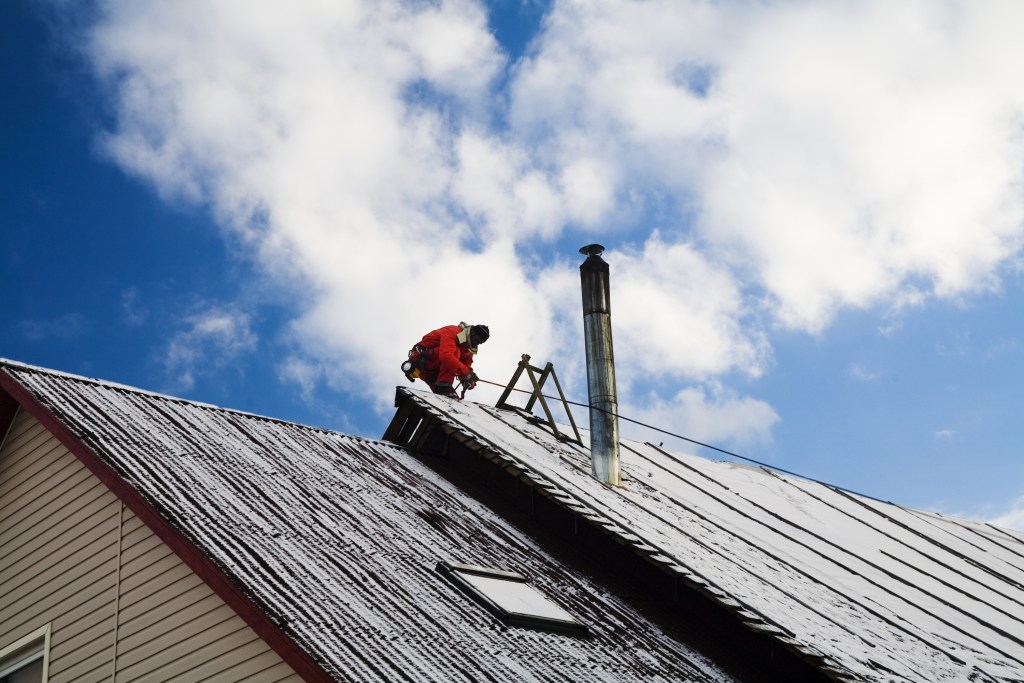Nobody wants to roof during the winter months, especially in the Northern states. However, sometimes there’s no other option. If you are able, though, roofing during the spring, summer, or fall is the best time to get the job done. The reason for this is because temperatures are relatively mild, and the days are long.
Still, what if it’s mid-December, and a tree falls on somebody’s roof? They’ll certainly have to replace it then, won’t they? What if there’s a winter storm that leaves heaps of ice and snow on the roof, damaging it beyond the ability of simple repairs to fix it? Regardless of the reasons, you need to know when installing shingles in cold weather is OK because some roofing companies flat-out refuse. Where they see a hassle, you might see an opportunity.
In the article below, we’ll discuss what temperature is too cold to install shingles and other problems you need to keep in mind when roofing in the winter.

What temperature is too cold for roofing
As previously mentioned, the best times of year to do a roofing job are during the spring, summer, and fall. During these seasons, there are many days when temperatures average between 70 and 80 degrees (21-27 C). With that said, you can do most roofing jobs without real problems as long as the temperature stays above 40 degrees (4 C). If it drops below that, your roofing crew will begin to run into problems with adhesives that won’t activate without the sun’s heat.
Your reputation could suffer if you install a roof without paying close attention to the temperature. Plus, when temperatures drop below 40 degrees (4 C), you run the risk of any warranties becoming void.
Ice and snow
While there may be opportunities to land a job where other roofing companies have declined, there are situations where those other companies may simply be exhibiting wisdom. Ice can slick a roof; it can be hard to see; and your workers could take a nasty fall as a result. Moreover, snow can hide the features of a roof, such as badly damaged areas or skylights where a misstep could also cause someone harm.
Problems with materials
In addition to the issues with ice, snow, and adhesives not activating, you also may have issues with shingles becoming brittle and breaking. With the quality of your materials suffering due to cold temperatures, there’s an increased risk that the quality of your roofing job will be below standard. Again, that could lead to a loss of reputation.
Problems with equipment
In addition to the problems mentioned with materials, you could also find yourself having issues with your equipment. Roofing tools like nail guns can stop working altogether if it’s cold enough. That means you’ll have to nail shingles down with an old-fashioned hammer, which can slow your progress significantly.
Roof materials that are OK in winter
Some types of roofing jobs are OK in the winter. They’re not as common, but they exist. Remember that roofing jobs involving shingles run into problems with adhesives. However, doing a roofing job with a metal roof doesn’t require adhesives. Risks due to ice and snow are also lessened a bit because snow usually slides off. You’ll still need to be cautious if there’s ice, though.
One issue to look out for when installing a metal roof is getting a metal panel caught by a blast of wind on a cold, blustery day. That can be both difficult and dangerous.
You also need to remember that no matter what type of roof you’re working on, the entire project could take much longer than it would during warmer months. The sealing process can’t happen if temperatures are below freezing. If at all possible, wait until temperatures are above freezing to finish the job unless it is an absolute emergency.

The final word
There are times when a roof must be repaired or replaced, and it must happen now. Due to whatever circumstance, the job can’t be put off. If that’s the case, and the temperatures are less than ideal, you might find yourself with an opportunity to take on a new customer. Many roofing companies will decline winter jobs altogether.
If you choose to do a roofing job during cold temperatures, it’ll help if you have an experienced crew. Regardless, you’ll need to prepare and take all necessary safety precautions. Remember that you or your workers could face serious injury if you aren’t careful, and your reputation could suffer.
If you’re still willing to risk rain, hail, sleet, and snow, you might just end up being some homeowner’s hero.


